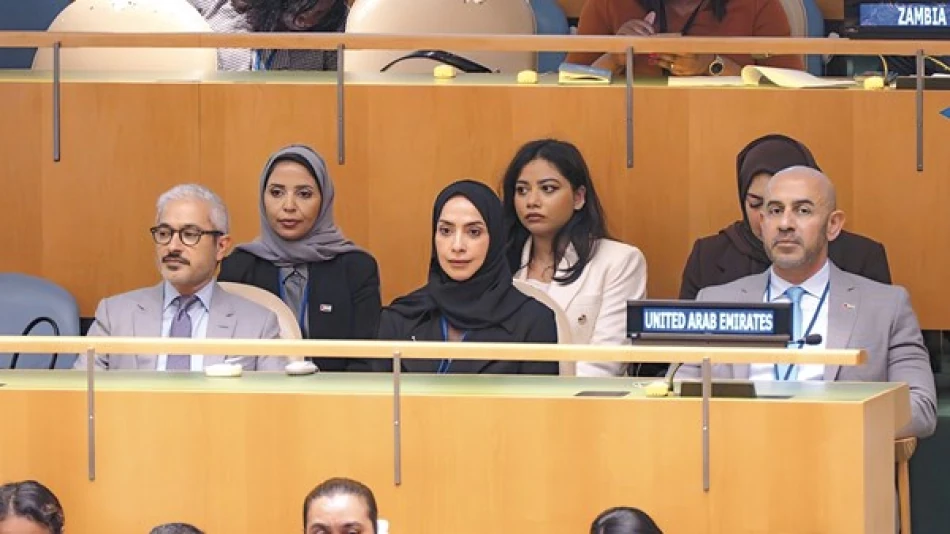
UAE Leads Sustainable Development Globally: Showcasing its Pioneering Role
UAE Positions Healthcare Innovation as Key Driver for Global Sustainable Development Goals
The United Arab Emirates is leveraging its advanced healthcare ecosystem to accelerate global achievement of the UN's 2030 Sustainable Development Goals, presenting a comprehensive strategy that combines artificial intelligence, telemedicine, and cross-border partnerships. At the UN Sustainable Development Forum 2025 in New York, UAE officials outlined ambitious plans extending beyond 2030, proposing a new framework for 2045 that emphasizes multilateral cooperation and integrated health systems.
Strategic Focus on Health as Development Catalyst
Abdullah Nasser Lootah, Assistant Minister for Cabinet Affairs for Knowledge Exchange and Competitiveness and Chairman of the National Committee for Sustainable Development Goals, emphasized the UAE's commitment to practical initiatives with lasting developmental impact. The country's approach centers on supporting healthcare sectors in developing communities, particularly in Global South nations where healthcare infrastructure remains fragmented.
"Investment in strategic projects with long-term impact in vital sectors like health, awareness, and prevention is essentially investment in human capital," Lootah stated, highlighting the UAE's methodology of combining local development with global knowledge sharing.
Beyond Traditional Aid Models
The UAE's strategy diverges from conventional development aid by focusing on sustainable, transformative partnerships rather than short-term assistance. This approach reflects lessons learned from previous development cycles where temporary interventions failed to create lasting change. The emphasis on knowledge exchange and competitive frameworks suggests the UAE is positioning itself as a hub for South-South cooperation in healthcare innovation.
Technology-Driven Healthcare Solutions
Dr. Manal Omran Taryam, Executive Director of the Noor Dubai Foundation, outlined the UAE's technology-centric approach to healthcare delivery. The foundation's AI-supported primary healthcare networks represent a scalable model that other developing nations could adopt.
"Technology and innovation form the core of our country's approach to sustainable development," Dr. Taryam explained, citing telemedicine, artificial intelligence, and smart screening tools as key components in removing geographical barriers to healthcare access.
Proven Track Record
Since 2008, the Noor Dubai Foundation has improved the lives of over 33 million people across Asia and Africa through integrated eye health programs. The foundation's "Ibsar" (Vision) project demonstrates how targeted healthcare interventions can scale across regions with similar challenges, offering a replicable model for other health sectors.
Post-2030 Vision: A New Development Framework
The UAE delegation organized a high-impact roundtable session at the country's UN mission, presenting new concepts for healthcare systems in post-2030 sustainable development. This forward-looking approach addresses growing concerns that the current 2030 framework may be insufficient for emerging global health challenges.
Interconnected Development Goals
The UAE's presentation emphasized the interconnected nature of sustainable development goals, particularly linking Goal 3 (Good Health and Well-being) with Goal 1 (No Poverty) and Goal 13 (Climate Action). This systems thinking approach reflects sophisticated understanding of how health outcomes influence broader socioeconomic development.
The proposed 2045 framework focuses on multilateral, cross-disciplinary cooperation—a recognition that future global challenges will require more integrated responses than current siloed approaches allow.
Market and Investment Implications
The UAE's healthcare diplomacy strategy positions the country as a potential leader in the growing healthtech sector in emerging markets. By establishing itself as a knowledge hub and technology provider, the UAE is creating opportunities for its domestic healthcare and technology companies to expand internationally.
This approach mirrors successful models from Singapore and South Korea, where government-led international development programs created market opportunities for domestic industries. The focus on AI-supported healthcare solutions aligns with global trends toward digital health transformation, potentially attracting international investment and partnerships.
Climate-Health Nexus
The integration of climate action with health initiatives reflects growing recognition that environmental degradation poses significant health risks, particularly in developing regions. The UAE's emphasis on climate-health financing tools suggests opportunities for innovative financial instruments that address both environmental and health challenges simultaneously.
Global Context and Competitive Positioning
The UAE's healthcare-focused development strategy comes as traditional development aid faces criticism for limited effectiveness. Countries like China have gained influence through infrastructure-focused Belt and Road initiatives, while the UAE is carving out a niche in human capital development and healthcare innovation.
This positioning is particularly strategic given the UAE's geographic location between Asia and Africa—regions that will experience the fastest population growth and urbanization in coming decades. By establishing healthcare partnerships now, the UAE is building relationships that could prove valuable for future economic and political cooperation.
The UN Sustainable Development Forum 2025 serves as the primary platform for reviewing progress toward the 2030 agenda, with participating delegations conducting in-depth assessments of five key goals including health, gender equality, decent work, marine life, and partnerships. The UAE's proactive approach to post-2030 planning suggests confidence in achieving current targets while preparing for next-generation challenges.
Most Viewed News

 Layla Al Mansoori
Layla Al Mansoori






